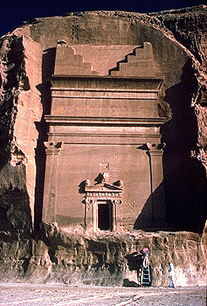
EARLY HISTORY
The Middle East, of which Saudi Arabia is an integral part, is the birthplace of civilization. It is in this area that man first settled in farming communities, developed agriculture, domesticated livestock, perfected trade and invented writing, setting the stage for the rise of civilizations such as Babylon, Nineveh, Phoenicia and Egypt. On its perimeter, and at a later stage, other great civilizations, such as Greece and Rome, would flourish. benefiting from the social and economic systems pioneered by the people of the region.
The inhabitants of the Arabian Peninsula developed a civilization of their own that defied outside conquest. They interacted economically and culturally. trading with communities in the Fertile Crescent, which stretches from what is present-day Iraq through Syria to Turkey, as well as with Egypt, the Roman Empire and other peoples beyond their immediate area.
Cities along the western and northern edge of the Arabian Peninsula were located on a major overland trade route. Evidence of extensive commercial trade dating from 3,000 B.C. has been discovered along this route. Early trade commodities included agricultural products, spices, textiles, gold and frankincense.
The lifestyle of the early Arabs was deeply influenced by the desert, which fostered a strong sense of independence and adaptability to a challenging environment. Some Arabs turned to agriculture, forming settlements around a well or in an oasis. while others became nomads, traveling with their flocks across the desert in search of water and grazing land. Caravan cities formed along the western Red Sea coastal region of the peninsula. Although the desert environment was difficult to endure, it provided isolation and protection for the Arabs throughout the centuries.
